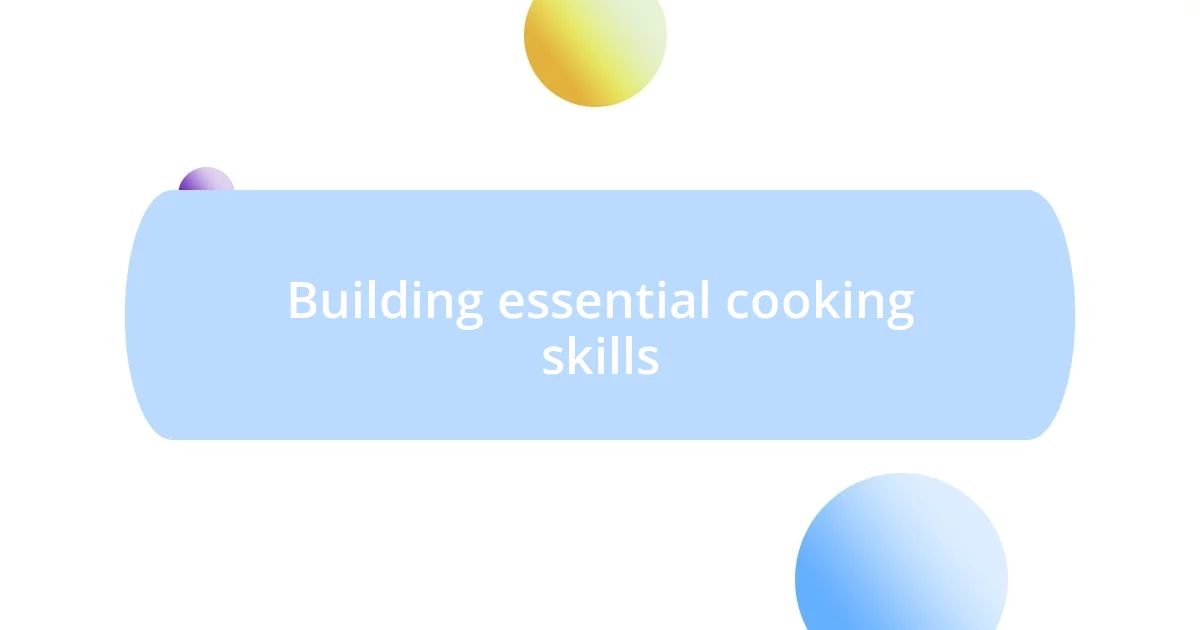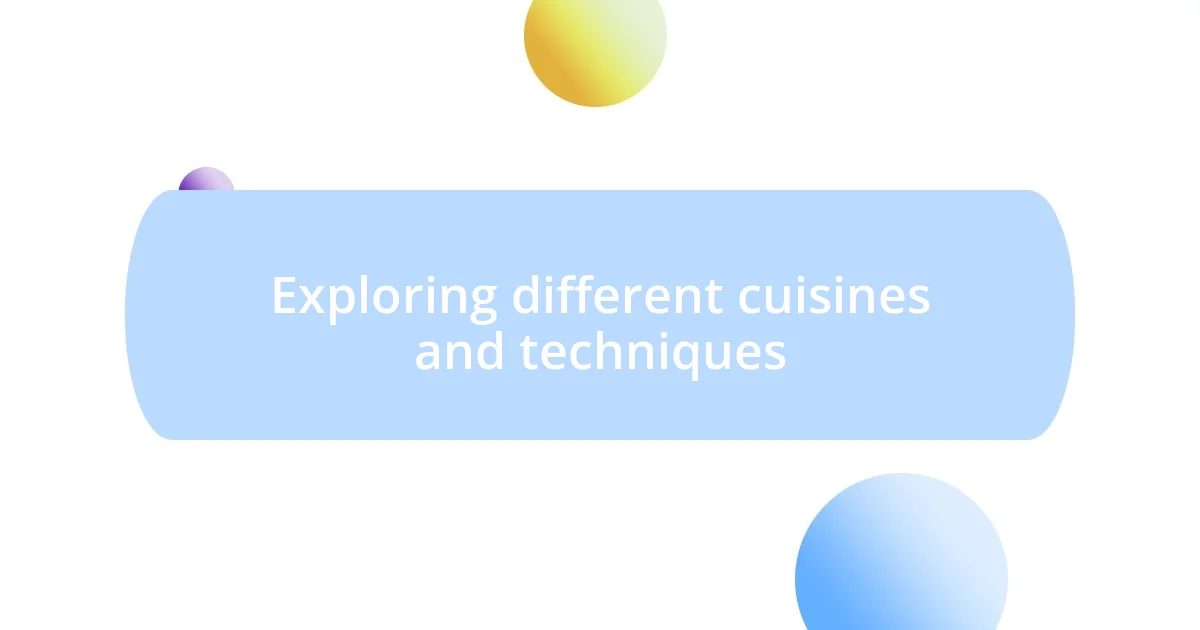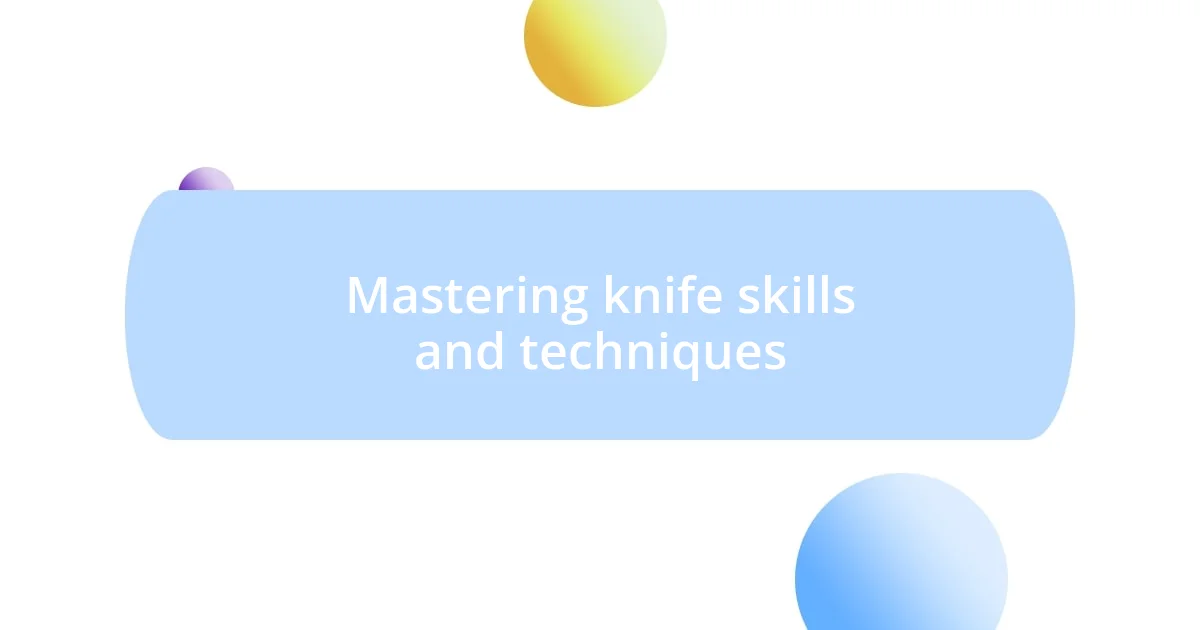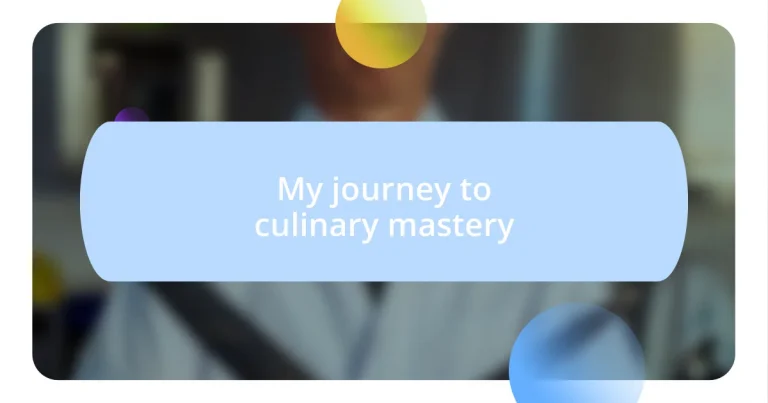Key takeaways:
- Mastering culinary fundamentals, such as flavor profiles and knife skills, is essential for building confidence and creativity in cooking.
- Exploring diverse cuisines and techniques enhances culinary identity, allowing for innovative dishes that reflect personal experiences and cultural stories.
- Embracing continuous learning and experimentation, through classes and mistakes, fosters growth and inspiration, transforming cooking into a journey of creativity.

Understanding culinary fundamentals
Culinary fundamentals form the backbone of every great dish, and I can’t emphasize their importance enough. I remember the first time I properly sautéed onions; the aroma instantly filled my kitchen, and it was like a light bulb went off. Isn’t it fascinating how mastering basic techniques can elevate your cooking skills exponentially?
Understanding flavor profiles and ingredient pairings is another crucial aspect of the culinary world. When I first experimented with combining sweet and savory elements—like bacon with maple syrup—I was amazed at how these seemingly contrasting flavors came together in harmony. Can you recall a dish that surprised you with unexpected flavor combinations? Those moments not only enhance our palates but also ignite our creativity in the kitchen.
Knife skills might seem trivial at first, yet they profoundly impact our efficiency and presentation. I once struggled with my chopping technique, leading to uneven cuts and frustration. Gradually, with practice and patience, those same skills transformed my cooking experience. Doesn’t it feel rewarding to progress from a clumsy beginner to a proficient home chef? Embracing these fundamentals early on can truly provide the confidence to experiment and innovate in our culinary journeys.

Building essential cooking skills
Building essential cooking skills is like assembling the pieces of a puzzle; each piece adds a layer of understanding that enriches the overall picture. I clearly remember the day I learned how to properly sear meat. The sizzling sound and the golden-brown crust that formed were incredibly gratifying. That moment made me realize how a simple technique can transform a dish and promote a connection to what’s on my plate.
Here are some fundamental skills to focus on:
- Knife skills: Practice different cuts, such as julienne and brunoise, to improve efficiency and presentation.
- Sautéing and searing: Mastering heat control can unlock flavors and textures that elevate your meals.
- Baking basics: Learn how to measure ingredients accurately; baking is a science.
- Flavor balancing: Get comfortable with adjusting salt, acidity, and sweetness to create harmonious dishes.
- Cooking methods: Explore techniques like poaching, roasting, and grilling to diversify your cooking repertoire.
Building these skills might seem daunting initially, but each small victory fuels your passion. I recall my early attempts at poaching eggs—each one was an adventure filled with hope and occasional kitchen mishaps. Perfecting that technique felt like winning a mini-gold star, showing me that confidence grows with each dish tackled.

Exploring different cuisines and techniques
Exploring different cuisines has been one of the most enriching aspects of my culinary journey. Each cuisine tells a story, reflecting its culture and history. I vividly remember my first encounter with Indian cooking; the complex blend of spices dazzled my senses. I spent hours just tasting and learning how each ingredient played its part in the symphony of flavors. It’s amazing how each dish resonates with the emotions and traditions of its people.
As I delved into various techniques from across the globe, I found myself gravitating toward authentic practices. The French technique of confit, for instance, opened a new world of preserving flavors and textures. My first attempt at making duck confit taught me patience; slow cooking and seasoning took my flavors to a whole new level. Have you ever tried a culinary technique that completely shifted your perspective on cooking? For me, this moment came while perfecting my sushi rolling skills—the balance between freshness and technique was a delightful challenge that amplified my appreciation for precision in food preparation.
The idea of fusion cuisine has also captured my attention. Combining the hearty flavors of Italian pasta with the finesse of Japanese ramen was a creative leap I never anticipated. I remember sharing this unique dish with friends, who were pleasantly surprised by the harmonious blend of styles. It sparked laughter and conversation, reminding me that food is not just about sustenance, but also about bringing people together through shared experiences. The more I explore, the more I realize that each foray into a new cuisine or technique further enriches my culinary identity.
| Cuisine | Key Techniques |
|---|---|
| Italian | Pasta making, sauce building |
| Japanese | Sushi rolling, knife skills |
| Indian | Spice blending, slow cooking |
| Mexican | Layering flavors, grilling |

Mastering knife skills and techniques
Mastering knife skills has been a game-changer in my culinary journey. I still recall the first time I diced an onion; the precision needed felt monumental but, ultimately, exhilarating. Each slice not only improved my speed but also elevated the presentation of my dishes, inspiring confidence in my abilities. Have you ever felt that surge of pride over a simple yet essential skill?
I remember investing time in practicing the chiffonade technique—it’s where you stack, roll, and slice leafy greens into thin strips. The first few attempts were clumsy, and I faced a frustrating array of uneven cuts. But after some perseverance, the satisfaction of achieving those perfectly delicate ribbons was rewarding beyond measure. This experience taught me that mastery isn’t just about performance; it’s about embracing flaws and honing your craft.
As I delved deeper into the world of knives, I learned the importance of proper grip and posture. Initially, I struggled with holding the knife as if it were a lifeline. I had to remind myself that a steady, controlled grip builds not only my confidence but also my efficiency in the kitchen. It’s fascinating how these tiny adjustments can drastically influence the outcome. When was the last time you made a subtle change that transformed your approach to a task? For me, it was exploring the rhythm and flow of chopping—it’s almost meditative, turning cooking into not just a responsibility, but an art form.

Developing a unique culinary style
Finding my unique culinary style has been an exciting evolution filled with self-discovery. I once thought culinary mastery was about perfecting classic dishes, but I’ve since learned it’s also about embracing my personal tastes and experiences. One of my most unforgettable moments was creating a dish that paired spicy chorizo with sweet mango salsa—something so simple yet reflective of my love for contrasting flavors. Each time I make it, it connects me to sun-drenched summers I spent in Spain, and I can feel my essence woven into the meal.
Embracing local ingredients is another vital aspect of developing a personal culinary style. During a farm visit, I stumbled upon heirloom tomatoes that tasted like summer itself, and it sparked an idea for a fresh summer salad. By highlighting the freshness of seasonal produce, I learned that simplicity often brings out the best flavors. It also made me realize how important it is to honor the ingredients. Have you ever tasted something so fresh that it left an imprint on your memory? For me, it was that moment with the heirloom tomatoes that shifted my focus to what I could bring to the table through local sourcing.
Over time, my culinary style has also been influenced by my travels and the stories of the people I’ve met. I remember dining with a family in Morocco; the warmth of their hospitality and the depth of their flavors moved me in ways I hadn’t anticipated. I began replicating their tagines, infusing my dishes with the narratives I collected from my travels. Isn’t it fascinating how food can embody not just flavors but feelings and experiences? My culinary style is a tapestry of those moments, blending my personal history with a deep respect for the culinary traditions I’ve encountered, creating something uniquely my own.

Embracing continuous learning and practice
As I navigated my journey toward culinary mastery, I embraced the idea that continuous learning is essential. One evening, I signed up for a last-minute cooking class focused on Asian cuisine. Surrounded by fellow food enthusiasts, I felt a mix of excitement and intimidation—especially when I realized how little I understood about flavor balancing. It was a humbling experience that reinforced my belief that every cooking session is an opportunity to grow, expand my palate, and refine my technique.
Just the other day, I caught myself watching a documentary featuring renowned chefs and their culinary philosophies. They shared insights that made me rethink my approach to seasonal ingredients. I decided to experiment with a new dish using ingredients I’d haven’t explored before, like jackfruit. The first time I worked with it, I made a total mess! But instead of feeling disheartened, I found joy in the process of experimentation. Have you ever realized that your best meals often stem from mistakes? Embracing that spirit of trial and error has propelled me forward, making the kitchen a constant playground for creativity.
Deepening my culinary knowledge extends beyond just techniques; it’s also about finding inspiration everywhere. I remember the day I visited an artisan bakery. The aroma of freshly baked bread filled my senses, igniting a desire to learn the craft of baking. It struck me how each loaf tells a story—that’s part of what makes food so incredibly beautiful. Have you ever felt that spark of inspiration from something unexpected? For me, it was a simple loaf that transformed the way I viewed the culinary art, reminding me that every encounter brings new lessons and experiences into my life.














